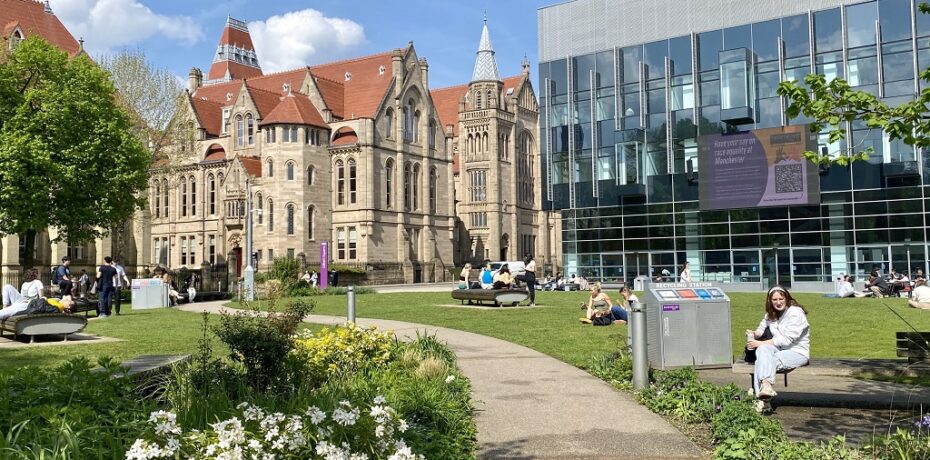The Subplot
The Subplot | Rich graduates are dictating the future of property. Here’s why
Welcome to The Subplot, your regular slice of commentary on the business and property market from across the North of England and North Wales.
THIS WEEK
- We heart rich graduates: how the property market increasing depends on wealthy twentysomethings
- Elevator pitch: your weekly run down of what’s going up, and what’s heading the other way
YOUNG AT HEART
Why Northern offices and resi are all about wealthy twentysomethings
High-earning Millennials and Zoomers are behind the big thinking in Northern office and residential markets. Let’s hope there’s enough of them.
We used to call them yuppies: young urban professionals, and the expression implied some scorn. Today, the scorn is long gone. This age group is what the property market is all about.
Earlier this week the Office for National Statistics published data on graduate creation and graduate retention, data that will determine what offices and apartment blocks get built in the next few years. The ONS looked at people born in the early 1990s, examined their GCSE results, and wondered where they were by 2018/2019? The same town, or somewhere else, and if so where?
Grads love some cities
So what did they find? That the big cities did well. Manchester enjoys the dream outcome of having more graduates than it produces, with high net inward migration of graduates, plus high levels of retention. The same goes for non-graduates with advanced qualifications. In numbers, about one-third of Manchester school kids become graduates, and three-quarters of them stay put in the city. Meanwhile, the city sucked in graduates from elsewhere: new arrivals provided a 91% boost to graduate numbers.
And not others
Leeds comes out the same: a few less Leeds kids become graduates and rather fewer stay but it does every bit as well at attracting newcomers. In 2018 to 2019, 64% of graduates and 33% of qualified non-graduates living in Leeds had moved there from elsewhere. In Manchester, 61% of graduates and 34% of qualified non-graduates living in Manchester had moved there from elsewhere. You get the idea: graduates like Leeds and Manchester. Sheffield is a step down (50% and 21%), Liverpool another step lower (34% and 15%), and then it falls off a cliff (Bradford, 14% and 15%).
Grads need smart offices
A lot of higher level thinking turns on these numbers, and top of the pile of reports is one from the Resolution Foundation that pointed out that the UK’s regional cities were miles behind productivity (GDP per head) than London, or comparable regional cities elsewhere in Europe. The foundation posed itself a thought experiment using Manchester and Birmingham as surrogates for the regional economy outside London: “So, what would it take to reduce Greater Manchester’s productivity gap with London to 20%?” The answer for Greater Manchester was “increasing GM’s business capital by 15%…and its graduate workforce by as many as 180,000.“ This would take graduate employment up from today’s 37%, putting it in line with higher performers like Glasgow. That means finding places for them to live and work.
Makes older people nervous
Which sounds fine, but gets complicated. Manchester City Council is now brewing a new economic strategy, having latched onto the Foundation’s report, and has commissioned property agency OBI to turn that into office market floorspace numbers, which are bound to be large. This comes on top of an office development target in the newly approved Places for Everyone city-regional spatial strategy. The combined effect was to cause jitters in a nervy office market worried that it’s teetering on the edge of oversupply.
Get with the kids
A rear-guard action from office market participants making a case for measured, slowly-does-it office development and a lot more refurbishment of existing good sub-Grade A office stock was underway before and during MIPIM. Some of those involved think the city council’s top team now understands the risks of betting the Town Hall on building a megaton of graduate-friendly offices, and hoping occupiers arrive to fill them. “The message is slowly being absorbed,” one tells Subplot. Others aren’t so sure.
Grads need funky flats
The residential element of the equation is also complicated. Co-living – the fancy rental flat-share concept – has been touted as having a role here. Some city councils – Manchester and Sheffield – have said yes, others no, or maybe. Viability will largely depend on how much inward graduate migration a city has and is likely to have in the future. Research this week from Gerald Eve shows just how enormously reliant co-living is on a vast supply of (on average) 28-year-olds earning (on average) £37,000, and most striking of all, about half are from overseas.
You’re not in London now, Toto
Gerald Eve suggests London could have about 600,000 co-living beds, but will have only 11,500 by 2027, and posits room for growth to plug a gap in purpose-built student housing. In the North things won’t look so hot. The average wage for a 28-year-old doesn’t get anywhere near £37,000 in the North East, North West or Yorkshire (about £10,000 short – the data is a touch dated, but the point remains valid). But in the North West it’s only the 90th percentile – the very thin top slice – who take home enough to pay the co-living bills (£40,000), and same in Yorkshire (£37,000) but in London it’s the 70th percentile. That’s a much larger share of a much larger group.
Icing on the cake
So the target is a very small slice of top earning graduates, and it’s the same for high-end build-to-rent. Thus CDL Hospitality Trust’s The Castings provides a mass of co-living style facilities for residents of 77 one-bed and 39 studio apartments. Rents are £1,150 per month for a studio apartment, £1,250 for an one-bed apartment. If housing is assumed to be about a third of post-tax income (and it’s often more) that implies annual incomes of £54,000 before tax, which is not just at the top of the scale for the 22-29 age group, but way above it.
High-earning Millennials and Zoomers are the holy grail of property development. Whether there’s enough of them outside London to do the heavy economic lifting is still far from clear, and it’s an open question what kind of city you get if you focus heavily on young professionals. It may not be the most inclusive or most diverse.
 ELEVATOR PITCH
ELEVATOR PITCH
Going up or going down?
Shed availability is going down, and down, and down, which is good news for landlords and investors. Meanwhile Manchester skyscrapers are going up thanks to a special funding pot. Doors closing.
 Shed availability
Shed availability
Warehouse availability in the North is much tighter than in the South or the Midlands, and the smaller the shed, the fewer of them there are to let.
Intriguing regional data from CoStar on the availability of all sizes and ages of warehouse reflects the last three years of sheds-a-go-go development. In pretty much every size bracket the North has less floorspace on the market than other shed hotspots because it never got quite so hot.
The North East is the tightest, with an availability rate of 4.3%. with starts-on-site low and slow, it won’t grow much in the immediate future. The North West and Yorkshire and the Humber have the next lowest availability rates in the North at 4.5%. Again, starts are down 40% on last year, so expect the availability rate to go down, not up.
The striking gaps in availability are under 50,000 sq ft, and 100,000 sq ft – 250,000 sq ft.
As for the bigger sheds, US private equity is buying up logistics names like they’re in a fever. Wincanton is in the midst of a £760m offer, DX was sold at 30 times its earnings forecast, the kind of valuation that justifies the exploding head emoji. When the new owners come to their senses, will they want more big sheds? Hmmm.
- Learn more about the industrial market in the North West. Book your North West Industrial + Logistics ticket. Interested in how the market is faring on the other side of the Pennines? Secure your spot at Yorkshire Industrial + Logistics.
 Supporting skyscrapers
Supporting skyscrapers
Politics is all about choices. Greater Manchester Combined Authority – Mayor Andy Burnham and the 10 council leaders – meet tomorrow to nod through another tranche of loans to apartment developer Renaker. This time it’s £140m from its housing investment fund to back two more towers at Great Jackson Street, one of 50 storeys and one of 61, Place North West reports.
The fund has already supported eight Renaker schemes. So far the Manchester skyscraper developer has scooped £508m of the £942.5m pot. In strictly commercial terms the GMCA is getting its money back. And Renaker isn’t doing badly.
Get in touch with David Thame: david.thame@placenorth.co.uk





What happens to Manchester when the Chinese government turn off the student tap?
By Chris
What happens?…well it’s already happened before. They always turn it back on again.
By Raymond chow